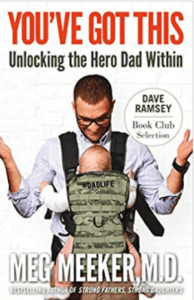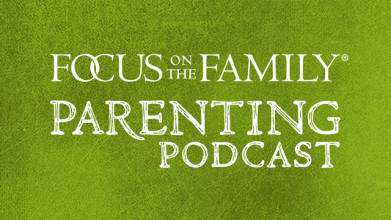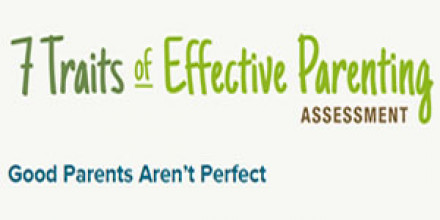John Fuller: Last time on Focus on the Family, Dr. Meg Meeker was our guest, and she talked about the incredible importance of fathers.
Recap:
Dr. Meg Meeker: Children need their fathers engaged in their lives, even if the wives don’t think the father’s a great husband, that child needs parts of his father. There is something great that you have that your child wants.
End of Recap
John: Well, Dr. Meeker is back with us today and thanks for joining us. I’m John Fuller, and your host is Focus president and author Jim Daly.
Jim Daly: John, we heard a great discussion last time with Dr. Meeker. She is a big fan of dads, which comes through loud and clear. Uh, dads are under a lot of pressure. Uh, we’re doing the best we can, but it’s always great to get a pat on the back to encourage us. Think of that, honey over sticks. And I think that’s the most positive aspect of the discussion last time. Um, letting dads know that even when parenting is tough, we need to hang in there and keep moving forward. Uh, Dr. Meg Meeker has written a wonderful book, You’ve Got This: Unlocking the Hero Dad Within.
John: And of course we have, uh, copies of that book here. If you missed the last conversation, we talked about the power of a father’s words and his influence on sons and daughters, also discussed feminism and other topics in the culture. If you missed that conversation, uh, swing by the website, focusonthefamily.com/broadcast to get a download, or if you prefer, order a CD.
Jim: Uh, let’s pick up where we left off last time. Uh, you were talking very intimately about your father and fathers who blow it, and the need for them not to pull back. And even in that area, you described the teenage girl whose dad doesn’t know to hug her anymore, those things. It caught my attention because Jean and I, when we first got married, um, you know, she struggled with, uh, that intimacy, just holding hands and hugging. And we started to talk about it. And her father pulled back at about 12, 13. Um, she remembers it being that her mom had said something to him like, “Honey, your, your girls are now blossoming, it’s not appropriate for you as a father to be physically touching them or hugging them.” That happens. You didn’t describe it last time that way. But that also happens where the dad is asked by the mom not to show that kind of affection to a teenage daughter and the dad backs up-
Dr. Meeker: Exactly.
Jim: -and then the child’s left hanging out there, “Doesn’t dad love me?”
Dr. Meeker: Exactly. And you look at young teenage girls who are sexually active at 14, 15 and 16, and I’ve seen scads of them, unfortunately. And they will say the reason they do it is to have somebody touch them and hug them. And it’s for a male figure. And so really one of the best things that a father can do to help his daughter stay away from sexual activity early is to give her physical affection. And interestingly there’s research that shows the number one way to boost a girl’s self-esteem is to have her father show her more physical affection. It isn’t to, you know, get her a piano tutor, or help her get her grades up, or give her ice skating lessons or…
Jim: All those, those things are good.
Dr. Meeker: Those are good.
Jim: Right.
Dr. Meeker: But, but we think of well, get help them learn to do something well and their self-esteem will go up. But interesting with girls, we know that it’s physical affection from a dad that makes them feel better about who they are as a person. And that’s telling particularly when we were talking about the influence and the power that father has on a child’s life, there you go. There’s that authority again, that, wow, my dad thinks that I’m lovely enough or wonderful enough or valuable enough for him to come and give me a big hug. I must really be something because children see their fathers as so enormous.
Jim: Right. And I’m sure Jean’s dad never knew that scar that he created in her heart.
Dr. Meeker: Well, exactly. And a lot of fathers wound their kids, not because they have bad intentions, it’s because they don’t know better.
Jim: Right.
Dr. Meeker: Or they think that’s what they’re supposed to do because their kids during their teen years give them vibes that they don’t want their father around, so the father goes okay, and he leaves and he walks away and that’s exactly the opposite of what you need to do. And so a big part of the work that I do again, is to show fathers what their kids need, even throughout ado- adolescence, so they don’t get their feelings hurt and they don’t over read their kids. They understand this child is confused, and to whatever degree they express discomfort with me, they’re expressing discomfort with themselves-
Jim: Right.
Dr. Meeker: -not me. So don’t take your kids personally dads.
Jim: Well, and for me this last a year or so Jean and I had foster kids living with us, five and three. And th- the older one was a girl which was new for me and for Jean. And I remember one night, uh, tucking her into bed and I would pray over the kids. And I remember she was in the upper bunk bed. So she kind of could look me eye to eye. And she’s looking through the little wooden greats there and she said, “I love you, Mr. Jim.” And I said, “I love you too and always be here for you.” And she took my hand, in her hand and started to stroke her little cheek with it. And I was kind of, uh, ’cause I have two boys, I mean, you know, we tickle each other before we go to bed, give each other pink bellies. But the tenderness of that moment really struck me.
Dr. Meeker: But what an incredible gift to her to understand, that’s her early exposure in life to male love is you.
Jim: Well and the appetite.
Dr. Meeker: Yes.
Jim: That’s what actually… It was lovely and it concerned me.
Dr. Meeker: Yes.
Jim: Because I could see her appetite for that affection.
Dr. Meeker: The hunger.
Jim: The hunger.
Dr. Meeker: I, I need affection and love from a man. And I will tell you if young girls early on in life are hurt by their father or a male figure, they will shut down any type of affection or reaching out to men later in life and to God himself.
Jim: Yeah. You talk about three questions and we promise last time we wanted to get to that.
Dr. Meeker: Yes.
Jim: And so, uh, let’s cover that. What are the three questions your kids need answered by their father?
Dr. Meeker: Yeah. I came up with these questions because they really are about growing the heart of your child and the spirit of your child. We’re so about, um, you know, teaching our kids to perform well. And we’re pretty good at that.
Jim: We are really all about that.
Dr. Meeker: Just to sign them up. Yeah. We’re all about the externals, but that’s not what makes them feel valuable as a human being. The first question every child needs their father to answer is what do you believe about me dad? And think about this. That’s what my father was answering to me when we talked yesterday on the program about when I didn’t get into medical school. And I overheard my father tell a friend that I was going to go. What he communicated to me in 30 seconds is, “I believe you have everything it takes to get to where you want to go.”
Jim: Right.
Dr. Meeker: And that changed my life. That changed my adult, the trajectory of my adult work. Every five-year-old girl or son, when they walk into a room, they want their father, they’re reading their father for clues about what he thinks about them. “Does daddy like what I’m coloring? Does he like what I’m talking about? Does he like what I’m wearing? Does he, like what I just built? Does he see me?” You know, they’re, they’re looking and searching for clues about what you think about them. And, and in short, they are, “Dad what do you believe about the person that I am? If you come home and you don’t even notice me and I’m sitting in the kitchen and you walk right by me, you believe I’m not worth noticing.”
Jim: Or I’m not there.
Dr. Meeker: Or I’m not there.
Jim: Probably the worst thing.
Dr. Meeker: You believe I’m invisible. Or if a father on the other end, you know, we’re so performance oriented in training our kids to be good performers today, and we follow them around to all their athletic games. If the only time we, we praise them and applaud them is when they’re on a soccer field, guess what that child learns to think you believe about him? Is that you believe he’s a really great soccer player and it’s worth watching him play soccer, but you really don’t give him any attention any other time. So boy oh boy, that kid’s going to keep playing soccer.
Jim: Meg let me, let me, uh, tease this out for you a bit, because of the way men think and fathers think, I think I qualify. Um, you, sometimes those things are important to you and you can get lost in that performance area.
Dr. Meeker: Yes.
Jim: And that can create some tension.
Dr. Meeker: Yes.
Jim: How does a man dial it back to understand the greater virtues that he needs to pass on to his children?
Dr. Meeker: Well, think back to when he was a kid, did he want from his dad? All those things are wonderful. You know, get your kids out playing sports, help them excel in things, but at the same time say, “When I was 15, if my father would’ve come in and said, man, oh man, I am so proud that you are my son.” Even if you just say that.
Jim: And I get that. And I think that’s in a healthy dynamic and the dad’s doing the right thing. But what if I said, “Yeah, my 15-year-old, he’s got a sharp tongue. He’s always mouthing off. He disrespects me. I’m going through that litany where some dads live in their relationship with their teenage son or daughter.” And you’re saying, and I’ve heard this clearly last time in this time, dad, you got the adult brain, you’re fully formed in your brain. You’ve got to act adult like, and you’ve got to overcome that and stay engaged even though you’re not feeling the love from that teenager. And I’m just saying, how do you go about starting that mechanism of looking beyond it, going beyond the angst that you’re getting from the teenager, the sharp words, the I don’t want to take the trash out line? How do you get over that, still be a loving father, and hopefully get them moving in a good direction?
Dr. Meeker: Right. Well, you know, here are a couple of things because a lot of kids end up that way. First of all, the snarkier and nastier your teenager behaves, the more that child is saying to you, um, he’s trying to get attention from you.
Jim: Yeah.
Dr. Meeker: That’s why kids do it. So he’s not trying to be mean because he dislikes you as a father, he’s really saying, “Please, please, please, please, please, will you pay attention to me and spend some time with me?” So if your child is really mouthing off and they’re in a bad place, you need to find some time for that child, and to be able to have time with that child and endure him.
Jim: Yes.
Dr. Meeker: Just endure, take him camping. You say, “Oh no, no.” Yep, you’re a man you can do it. (laughs) Get in a canoe and let him just rail on you if he feels like it, because it will come to an end. What he’s saying is, “Please, please, please, dad. You know, I need more of you.” So give him your time and don’t take him personally. And if you need to say pretend he is your neighbor’s kid for a couple of hours to endure what he’s saying to you, because you’re just going to go crazy, um, do that if you need to. And then as he starts to simmer down, then you say to him, “I am so glad you’re my son.” He’ll say, “What are you talking about? What are you talking about?” “But you know what? You can say anything you want, I am so glad you’re my son. Because one day you’re going to stop all this.”
Jim: Mmm.
John: Well, that takes a lot of, as you said Jim, adult thinking. (laughs)
Dr. Meeker: Manliness.
John: To not be so, um, to not feel so disrespected by that.
Dr. Meeker: Yeah, yes.
John: Because I mean they’re in your face saying, “Yeah, what are you going to do about it.”
Jim: Okay. What I would do if I took him canoeing is after he told me what he thought of me, then I’d splash him big time. (laughs)
Dr. Meeker: Go ahead.
John: Totally.
Jim: I’d be soaking them saying, “Hey, I love you, but I’m going to get you all wet.”
Dr. Meeker: Exactly. Whatever. (laughs) It’d be fine. That’d be fine because to him, it’s better than being ignored.
John: This is Focus on the Family and our guest today is Dr. Meg Meeker, who’s written the book we’re talking about, You’ve Got This: Unlocking the Hero Dad Within. And you can get your copy at focusonthefamily.com/broadcast or call us for the book or a CD of this program. Our number 800, the letter A and the word FAMILY.
Jim: Okay. Meg, you’ve covered one of the questions, what do you believe about me, which is convicting. I dunno if that convicts you a little bit, John?
John: I’m gonna think differently (laughs) about my children today.
Jim: Take that moment to tell your kids these things. Another question of the three was how do you really feel about me?
Dr. Meeker: Yes, yes, yes. You know, many, many great parents will tell me in my practice, “Oh, I love my kids. I adore my kids.” And yet when I talk to those kids who are usually teenagers, and I asked those kids who are struggling, usually the kids who have depression, anxiety, or they’re acting out, I say, “Who in your family loves you?” And they, they always say this, “Well, my mom does because she has to.”
Jim: Right. Mom’s love is constant.
Dr. Meeker: Mom, mom’s love is non-negotiable.
Jim: Why is that?
Dr. Meeker: Because every child feels, if your mother doesn’t love you, at least your mother, then your life isn’t worth living because it has to start somewhere. Now this is very interesting, but your father’s love is negotiable.
Jim: That’s the wild card.
Dr. Meeker: It’s a wild card. Now, even if a child has a fabulous father who would never leave, who tells his kids he loves them every day, in a child’s mind that child still needs to behave well because they can’t risk losing their father’s love. And that’s what I say, children approach their mothers and their fathers very differently. And as I say that, many adults will think back on their own child to go, “Yeah, I get it. When my dad walked in, I just wasn’t sure what he was thinking or feeling. But my mom, I could be mean to my mom because she couldn’t go anywhere.”
Jim: Yeah. And this is an old story. And I think Dr. Dobson even used this years ago, where at a prison, a greeting card company took Mother’s Day cards for them to fill out and write to their mom. And they had to go back to the warehouse to get more cards because everybody stood in line in that prison to send a note-
Dr. Meeker: Send to your mom.
Jim: -to the mom.
Dr. Meeker: Because dads…
Jim: But then, but then they did it for Father’s Day thinking they’d had the same great success. Not one prisoner wanted to send a note to his father.
Dr. Meeker: Yeah.
Jim: Think of that. Well, that’s what you’re saying.
Dr. Meeker: And that that’s a, a sad tale of where we are in our culture right now, is that I think fathers feel so marginalized and feel their value is so low in the family that men have just basically left. And my message is, if we don’t get our dads back in our homes, um, if you really want to restore our country, get our dads back-
Jim: Boy that’s powerful.
Dr. Meeker: -one by one by one. You want safer neighborhoods, safer schools, put dads back. It’s all you need to do. Forget about the police. Put dads back in the inner cities and the drug guys are going to go away.
Jim: Yeah. Because there’s accountability and authority.
Dr. Meeker: And authority. But how do you feel about me? So every… The cry of every child’s heart is, “Dad, do you really, really love me?” And kids will go to extremes to find out if dad loves them. I’ve had girls run off and get pregnant just to see if dad is still gonna to love them. I’ve sons who act horrible, horrible, who are nasty and mean because they’re testing their dads. What can I do to make you not love me anymore? And if they feel insecure in that love, they’re going to act out and be horrible people. And, and as I say, the more horrible they act, I look at those teenagers and the worst they act, the more I see inside them, this little child curled up in a ball in a fetal position, going, “Please, please, please, please, please tell me that you really love me.” And I father almost has the spell over a child. He can break that spell, “Yes I do. Yes, I do. You can go sit in a closet for the rest of your life, or you can act like a jerk the rest of your life. Guess what? You can’t shake me. If you go homeless and you get pregnant, you go do this, I’m a follow you.” Do you know of a book, The Runaway Bunny?
Jim: Yeah.
Dr. Meeker: That’s what a dad needs to be. You know, a little kid who runs away from his mom. “Well, I’m not going to be there. And if you… And I’m going to, you don’t love me and I’m going to go and I’m going to plant myself and be a flower and a garden.” And the mother says, “Oh, but I’ll become a flower right, right next to you.” “Well, then I’m going to go and be a boat on the ocean and the wind will come and take me.” “Well, then I’ll be the sail on the boat.” That’s what fathers need to do, chase after your kids and show them you love them no matter what it takes and say it.
Jim: Yes.
Dr. Meeker: You know, fathers whose feelings are hurt, who have a snarky 17-year-old who’s given him a hard time and they’re angry all the time. Do you know how you could break all that if you constantly say, “I love you anyway.”
Jim: Yeah.
Dr. Meeker: I love you anyway.
Jim: Yes, it’s so true. Here’s one of the difficulties I think we have as fathers, we think in a geometric terms. What I mean by that is we think that well for saying, I love you is nine cubic feet big. And we have shoved 11 cubic feet of I love yous in there. So that should be sufficient, and we walk away not realizing we’re nine cubic feet short. (laughs)
Dr. Meeker: Exactly.
Jim: Because they can never fill-
Dr. Meeker: You can never fill.
Jim: -that void.
Dr. Meeker: Right.
Jim: Now, you have to keep on doing it-
Dr. Meeker: We have to keep on doing it.
Jim: -working at it.
Dr. Meeker: And here’s one thing I’ve learned, if you feel you’re not getting through to your child, you sit them down and you say this, now this takes manliness. Okay? So I’m serious when I’m talking about heroes. You sit down with your 17-year-old son and say, “You know what, here are my concerns. I see that you are really unhappy and you’re really struggling, and you’re flunking out of school. And here’s what concerns me the most. I love you, but I’m not getting through to you. So what can I do as your father to show you how much I love you? What do you need from me? Show me how I can love you better?”
Jim: And then listen.
Dr. Meeker: And then listen, duct tape.
Jim: That’s so good.
John: So many, uh, emotions though can cloud, uh, especially a young adult or an adolescent thinking, how can they possibly respond with something that a dad can take and use?
Dr. Meeker: Well, this is what they usually do. Eventually they’ll usually start to cry, because they know you mean business. When a child knows the dad means business in communicating that he really loves them too, that’s really all you need to do. Because they don’t need magic from you, they just want to know that you really want to do it and you’re not going to go anywhere. That’s it. It’s so easy. You know, so many times I’ll tell teen girls, “Here’s the deal. What you need to understand about your dad, you say your dad doesn’t love you, I know your dad loves you because I know your dad. Here’s the problem. As a man, he’s trying to communicate, it becomes that sideways and you don’t see it. (laughs) So you need to talk to him.” And I will say this to a daughter right in front of her father. So I will say to her, “Tell him now what he needs to do.” And she will look at him with a blank stare, and then she’ll cry.
Jim: This is in your doctor’s office?
Dr. Meeker: In my office.
Jim: That’s amazing.
Dr. Meeker: I own my practice.
Jim: Yeah.
Dr. Meeker: Yeah, yeah. See government can’t take, you know, they can’t pin me down.
Jim: But that’s good. You’re doing so much more than healing a body.
Dr. Meeker: So much more because I realized years ago, if I want to help kids, if I don’t help their parents, if I help their parent, I don’t have to worry about child. So whenever I work with a child, I have to have the parent in the room because my job is to draw them closer not separate them.
Jim: So what do you see when you make that comment in your office-
Dr. Meeker: Tears.
Jim: -what does the daughter and the father do?
Dr. Meeker: She looks at him and he looks at her and they have blank stares and they realize they’re crossing wires. But they realize they love each other, but they’re not getting through. And then this crazy grandmother lady said, “What do you need to do?” And they don’t know what to do, but they know they want to. And that’s all they need.
Jim: Wow. That is really good stuff. Your third question was, what are your hopes for me?
Dr. Meeker: Yes.
Jim: You kind of covered that with your dad’s analogy, that story.
Dr. Meeker: I did yes. What are your hopes? Here’s why we need to communicate hopes. Teenagers don’t think past 23.
Jim: They go out that far? (laughs)
Dr. Meeker: Well, I was gonna say 25.
Jim: I’m thinking more like 18. (laughs)
Dr. Meeker: Yeah, particularly teenage boys and sexual activity. They think all the good stuff comes before 25 so they better get it all in then, because once they’re married, oh, it gets bad. And that, and we failed them.
Jim: Yes.
Dr. Meeker: Okay, so I tell them otherwise, (laughs) which makes them cringe because I’m 50 something. But here’s the thing we need to teach our teenagers to listen. My job is to get you to 25, when all the brain cells and everything have formed and shaped-
Jim: You are finally done.
Dr. Meeker: -and you’re finally done (laughs) and I can be your friend, and I can’t until then, is to teach you that I’m just getting you ready for all the good stuff. ‘Cause the good stuff really comes after 25. And they look at you kind of like you, they don’t know what you’re talking about, but you need to give them perspective.
Jim: Right.
Dr. Meeker: Case in point, this is how I get kids to be sexually abstinent. I walk into high schools and I say, “If you’re 15 years old, your body is wired to be sexually active until the average lifespan of a, a man, which is 75, 15 to 75, 60 years.” And they hoot and holler, and they scream, and they yell, and they go, wow, weird lady. But, and I say, “Now I need you to pay attention to what I say, because the next 10 years of your life are critical. If I as your pediatrician want you to have 50 healthy years, 25 to 75 and they go, “Whoa.” I say, “So if you pay attention to what you do the next 10 years, I guarantee you great sex for 50 years,” got them.
Jim: Interesting.
Dr. Meeker: And they all want… Got them. Because I give them perspective.
Jim: Right.
Dr. Meeker: The good stuff, the great stuff comes a little later. And that’s why your teenage years in high school, and maybe even college are not real great. Everybody tells you the high school years are great and go wild and do this and do this. But the good stuff, job, relationships, uh, you know, everything comes there. So that’s my job is to give you hope. Your good job is going to come when you’re in your 30s and your 40s.
Jim: That’s a good word. It’s so good.
Dr. Meeker: Hope, you pay your dues when you’re in your 20s. So if you’re 25 and you don’t know what you want to be, it’s okay.
Jim: I’ve talked to my boys about it in terms of God’s wedding night gift-
Dr. Meeker: Oh, yeah.
Jim: -and he’s got a special package wrapped up for you in your bride and you can’t open this until your wedding night.
Dr. Meeker: Yes.
Jim: And if you just can’t.
Dr. Meeker: But see, to a lot of kids who come from a divorced family, their wedding night is, “Why would I want to do that?”
Jim: Absolutely. And I, you know, Meg, we’re right at the end.
Dr. Meeker: Sorry running out of time.
Jim: Here we are, and I’ve got a bazillion things I want to ask you, but I want to speak to the single parent. It could be a mom or dad. Um, there’s more and more single parent fathers today.
Dr. Meeker: Yep.
Jim: But speak to their heart. Um, they’re gonna have to carry this load without help. And, uh, they don’t have the other gender present to bounce off of to emulate those things to the kids. How do they cope with that?
Dr. Meeker: Here’s what every single dad needs to know, God has given you all of the wiring that you need to parent your child really well. My job is to come along and tap a little spark to that wiring. It’s there. So don’t believe it’s not there, it’s there. Pray, God will help you. You can do a great job. It will take every morsel of strength and masculinity and prayer you have, but you can do it.
Jim: And moms too.
Dr. Meeker: And moms too. Absolutely. And moms and single moms help your children find a good, solid, safe male influence, brother, father, pastor somebody, and just bring that man to life for your child. Because particularly boys need to see a visual image in their mind of what a great man looks like. So bring that man to life, recognize that you can’t do it all by yourself, but that’s okay. You can do a good enough job. And that’s all your child wants is you to do a good enough job. Don’t need to be a great parent.
Jim: Meg, God is in all of this-
Dr. Meeker: All of it.
Jim: -we’ve talked about. We haven’t been overt.
Dr. Meeker: Yes.
Jim: I want to take just a minute, be overt about God’s role in all of this and what you as a father need to do to spiritually guide your kids to and point to your heavenly father.
Dr. Meeker: Yeah. You need to bring Christ alive to your children. You need to serve alongside your children. And my husband was fabulous about this. He never said to the kids, “I want you to do youth group. I want you to do Bible studies. I want you to go on missions,” he just took them.
Jim: Right. He didn’t ask permission.
Dr. Meeker: He just took them, and they all wanted mission work when they grew up. So you lead them you don’t coach them. Day by day by day, you focus on the play, you focus on today. You know, and, and if you’ve got an impossible 16-year-old that you are convinced is going to end up in jail, it’s just today, the work is not done. Give him… You’ve got nine more years with him. Get him to 25. That’s when all the brain cells are there. And brain cells are such a gift from God. (laughs) When he puts them in our kids. So focus on today, ask God for his grace today, ask God to give you the electricity to your wiring that you need today. He will, um, guide your speech, He will help your heart, He will, uh, help you have the strength to pursue your children, and He’ll show you how to be their hero. And a lot of times that, that’s just walking in front of them.
Jim: Yeah.
Dr. Meeker: That’s what heroes do, they walk in front.
Jim: Be a hero. Dr. Meg Meeker. This is terrific for two reasons, one, guys like manuals. (laughs)
Dr. Meeker: They do, yeah.
Jim: We want to read the instructions on how to construct it. This is that kind of a book. You can read this as a father, and it will give you some wonderful insights. Uh, in addition to that, some of us guys like me, I don’t read manuals that well. (laughs) I want to just build it without instruction. And that usually means I have a few screws and bolts and nuts leftover. (laughs) It hits there too.
Dr. Meeker: Yeah, well, any father, any father can be their child’s hero because in their child’s eyes, they already are the hero.
Jim: Yeah.
John: Well, some great conversation today with Dr. Meg Meeker and be sure to get her book, You’ve Got This: Unlocking the Hero Dad Within. And I might mention, we also have a CD of this broadcast, or you can get a download, or listen on the mobile app. All the details are at the website, focusonthefamily.com/broadcast, or call 800, the letter A and the word FAMILY.
Jim: And I hope you’ll also make a generous donation today to support the work of Focus on the Family. Day in and day out, we’re developing broadcasts and podcasts, resources designed to help you as a parent. And we’re encouraging you in that journey or your children who are raising your grandkids. Consider helping us with a gift to help them. If you can join our monthly support team, we’ll send you a copy of Dr. Meeker’s book as our way of saying thank you. And if you’re unable to make a monthly donation right now, we get it, uh, make a one-time gift and we’ll be happy to send you that book.
John: And as always, uh, if you need some inspiration and insight about your own parenting journey, take our parenting assessment, uh, that is free. It takes a few minutes. It will be very insightful for you. And it’s right there at focusonthefamily.com/broadcast. And join us next time as we hear from recording artist, Matt Hammitt and his wife, Sarah, as they open up about how Matt’s singing career really impacted their marriage.
Teaser:
Matt Hammitt: I’d see my wife in tears, and I turned, and I looked at the wedding picture sitting on a table right next to me. And I could see such a, like a stark contrast of the woman that was sitting in front of me seven years later. And it just broke my heart.





















